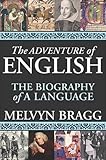 Melvyn Bragg’s book The Adventure of English: The Biography of a Language is a companion to the documentary series of the same name. It explores the twists and turns in the development and spread of English from its beginnings to the present day. I found it to be an entertaining read, and I certainly learned some interesting things about language that I will use in my American and British literature curricula next year. In many ways, it does seem astonishing that English has managed to become as important as it has given some of the close calls over the years: Alfred the Great’s defeat of the Danes (it was close) and 1066 just to name two. I did wish that Bragg had provided some footnotes and explained some of the etymologies he described. I can’t think of an example now that I’m reviewing, but I do recall as I read that at times I didn’t think his etymology agreed with what I read or learned elsewhere. It’s clearly in the camp of pop-history rather than scholarly writing, so perhaps readers should not expect a dissertation on the development of English going in, but it is highly readable. I did find myself lagging through the late middle of the book until I came to the section on Australian English, which I found much more intriguing than I thought I would.
Melvyn Bragg’s book The Adventure of English: The Biography of a Language is a companion to the documentary series of the same name. It explores the twists and turns in the development and spread of English from its beginnings to the present day. I found it to be an entertaining read, and I certainly learned some interesting things about language that I will use in my American and British literature curricula next year. In many ways, it does seem astonishing that English has managed to become as important as it has given some of the close calls over the years: Alfred the Great’s defeat of the Danes (it was close) and 1066 just to name two. I did wish that Bragg had provided some footnotes and explained some of the etymologies he described. I can’t think of an example now that I’m reviewing, but I do recall as I read that at times I didn’t think his etymology agreed with what I read or learned elsewhere. It’s clearly in the camp of pop-history rather than scholarly writing, so perhaps readers should not expect a dissertation on the development of English going in, but it is highly readable. I did find myself lagging through the late middle of the book until I came to the section on Australian English, which I found much more intriguing than I thought I would.
It might just be me, but I found long lists of words difficult. For instance, when Bragg is describing a list of words from Old English that still appear in everyday conversation on p. 6, he chooses to list them separated by commas. It may be grammatically correct to do so, but I quickly became lost and would have preferred a chart or table. Another quibble: Bragg refers to Seamus Heaney’s translation of Beowulf several times, and while I love Heaney’s translation, Bragg obscures the fact that it’s a translation or interpretation. The first word of Beowulf in Old English is Hwæt, which Heaney translates as “So.” It has been variously translated as “Lo,” “Listen,” “What,” “Now,” and “Indeed,” among others. I really can’t explain why it bothered me that Bragg said hwæt translated as “so” without providing it within the context of a Heaney translation until the following paragraph (pp. 13-14).
The book was a mostly enjoyable diversion. I think anyone interested in the development of the English language will find it interesting. I do plan to view the companion DVD series, which we have at my school.
Rating:




Ohhhhhh, I will have to add that to my wish list on Amazon. I loved the documentary series.
I can't look at long lists of words either. If a sentence on a page isn't going anywhere, my eyes slide out of focus. Maybe this one isn't for me…